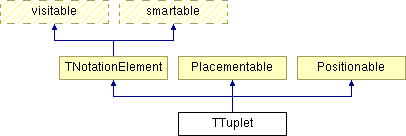
#include <TNotation.h>
Inheritance diagram for TTuplet:

Public Types | |
| enum | { undefined = -1, actual = 1, both, none, last = none } |
Public Member Functions | |
| virtual void | accept (TScoreVisitor &visitor) |
| void | setType (StartStop::type type) |
| the required type attribute | |
| void | setNumber (int num) |
| optional number for nested tuplets | |
| void | setBracket (YesNo::type bracket) |
| optional bracket attribute | |
| void | setShowNum (int sn) |
| optional display control | |
| void | setShowType (int st) |
| optional display control | |
| StartStop::type | getType () const |
| int | getNumber () const |
| YesNo::type | getBracket () const |
| int | getShowNum () const |
| int | getShowType () const |
| STupletDesc & | actualDesc () |
| STupletDesc & | normalDesc () |
Static Public Member Functions | |
| const string | xmlshow (int d) |
| convert a numeric show type to a MusicXML string | |
| int | xmlshow (const string str) |
| convert an MusicXML string to a numeric show type | |
Protected Member Functions | |
| TTuplet (StartStop::type type) | |
Friends | |
| EXP friend SMARTP< TTuplet > | newTuplet (StartStop::type type) |
The tuplet-actual and tuplet-normal elements provide optional full control over tuplet specifications. Each allows the number and note type (including dots) describing a single tuplet. If any of these elements are absent, their values are based on the time-modification element.
The show-number attribute is used to display either the number of actual notes, the number of both actual and normal notes, or neither. It is actual by default. The show-type attribute is used to display either the actual type, both the actual and normal types, or neither. It is none by default.
 1.3.3
1.3.3